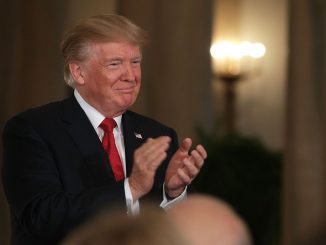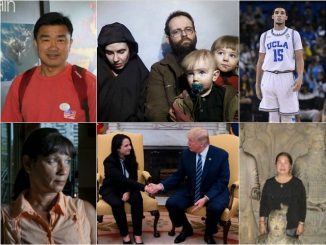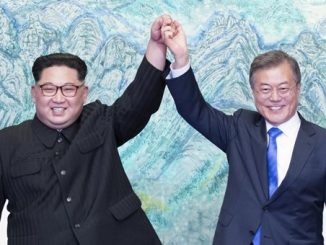President Donald Trump signaled that he’s open to talks with North Korea after Kim Jong Un’s regime told South Korean envoys that he is willing to consider giving up its nuclear weapons.
“Possible progress being made in talks with North Korea. For the first time in many years, a serious effort is being made by all parties concerned,” Trump said Tuesday in a tweet. “The World is watching and waiting! May be false hope, but the U.S. is ready to go hard in either direction.”

Kim Jong-Un shakes hands with South Korean chief delegator Chung Eui-yong on March 5. Source: KCNA/AFP via Getty Images
Trump commented after Kim told visiting envoys from Seoul that he was ready to suspend weapons tests and hold candid talks with the U.S. to normalize relations, if the safety of his regime was guaranteed, the South Korean government said Tuesday. In response, South Korean President Moon Jae-in agreed to meet Kim for a summit along their shared border late next month.
Analysts cautioned that North Korea has a history of using negotiations to buy time for its weapons program and secure sanctions relief. The Kim dynasty has over the years raised the prospect of abandoning its nuclear-weapons program, if the U.S. gave up its hostile policies. Serious negotiations haven’t taken place since so-called six-party talks — also including China, Japan and Russia — broke down in 2009.
“It’s progress — certainly more than most would have expected — but it’s still rhetorical,” said Robert Kelly, a political science associate professor at South Korea’s Pusan National University. While it’s unclear if Trump will agree to return to negotiations, he said, “the pressure will be on to talk.”
The Japanese yen weakened against the dollar after the announcement.
‘Maximum Pressure’
The U.S. and North Korea have been at loggerheads since the Korean War ended without a peace treaty almost 65 years ago, and Kim’s government has repeatedly said nuclear weapons were necessary to deter any U.S.-led military action. In November, he declared the program complete after successfully testing an intercontinental ballistic missile that arms control experts believe could reach any American city.
The launch was part of an escalating series of weapons tests last year — including a likely hydrogen bomb detonation in September — that alarmed Kim’s neighbors and prompted the United Nations to severely restrict trade to the country. Trump urged “maximum pressure” to force him to the negotiating table and warned in a speech to the UN General Assembly that the U.S. would “totally destroy” the country in any conflict.
Only last month, Trump imposed the toughest U.S. sanctions yet on North Korea, saying it could be a “very rough thing”if the measures don’t succeed.
“The key point will be whether Trump will allow any sanctions to be taken off — the most lethal threat North Korea wants to get rid of,” said Youngshik Bong, a researcher at Yonsei University’s Institute for North Korean Studies in Seoul. “If sanctions remain intact, time will not be on North Korea’s side, and the pain will continue.”
‘No Reason’
On New Year’s Day, Kim made an unexpected overture to reopen talks with Moon, who was elected last year after pledging to improve relations with his northern rival, ahead of the Winter Olympics in South Korea. A flurry of talks culminated in an unprecedented visit last month to South Korea by Kim’s sister, who offered a meeting with her elder sibling.
“North Korea has clearly expressed its intention for denuclearization on the Korean Peninsula, and if there is no military threat, and North Korea’s regime security is promised, they have clarified that there is no reason to hold nuclear weapons,” Moon’s office said Tuesday.
Trump administration officials said that North Korea’s Olympic delegation canceled a meeting with U.S. Vice President Mike Pence on the sidelines of the Games after he criticized the regime. That would’ve been the highest-level exchange between the two sides Trump came to office.
U.S. Engagement
Even so, Pence last month said the U.S. was ready to engage in talks about North Korea’s nuclear program even as it maintains pressure on Kim. He dubbed the new strategy “maximum pressure and engagement at the same time.”
North Korea’s previously committed to denuclearization during the six-party talks that began in 2003. The last round collapsed after Pyongyang defied the international community with the launch of a satellite that was perceived to be a test of an intercontinental ballistic missile.
Kim has resisted efforts to discuss his weapons program, with his envoy issuing a “strong complaint” when the South Koreans raised the issue early in Olympic talks. As recently as Saturday, North Korea said the country wouldn’t accept U.S. preconditions.
“It insists that it will have dialogue only for making the DPRK abandon nuclear weapons and persist in ‘maximum pressure’ until complete denuclearization is realized,” a North Korean Ministry of Foreign Affairs spokesperson told the official Korean Central News Agency. “This is really more than ridiculous.”
— With assistance by Daniel Ten Kate







Be the first to comment